The Story of Keith - the Bush Stone-curlew
Discovery
We have observed Bush Stone-curlew (BSC) for many years as they lived, fed and bred in our orchards, paddocks and surrounding blocks. Their behaviour conformed with the texts and papers we read. They are mainly nocturnal, secretive birds but you can see them during the day if you happen across them; their defence mechanism at such times is to remain statue-still. During the night you can hear their calls, blood-curdling wails and screeches. When we drive to our property at night we sometimes see them walking on the verge or road and they fly up into the night sky. Or if we walk around the local roads at night we might come across a breeding pair who will chase us away from their fledgling young.
One night during such a walk on a dark wet season night, no moon and overcast, our torch off, we heard a bird call and then I almost literally fell over a bird at my feet. Switching the torch on we discovered it was a young curlew. At such a point we would have expected the parents to appear with their wings outstretched creating an awful racket and attempting to chase us away or distract us from the chick. But no other curlews appeared; instead the young bird looked up at me and cried desperately. I crouched down to appear less threatening and began reassuring and comforting what was clearly a very distressed bird.
In the absence of parents we agreed the best thing was to first ensure the bird was safe and nourished. We turned to return home and to our astonishment the bird followed almost walking at our heel. In fact, a process known as 'imprinting' was underway and within a couple of minutes I had become a surrogate parent. I lead him to our property, up the drive and we prepared our back verandah for him - an enclosed area where he would be safe in the short term. Welcome to the family, Keith.
First Night
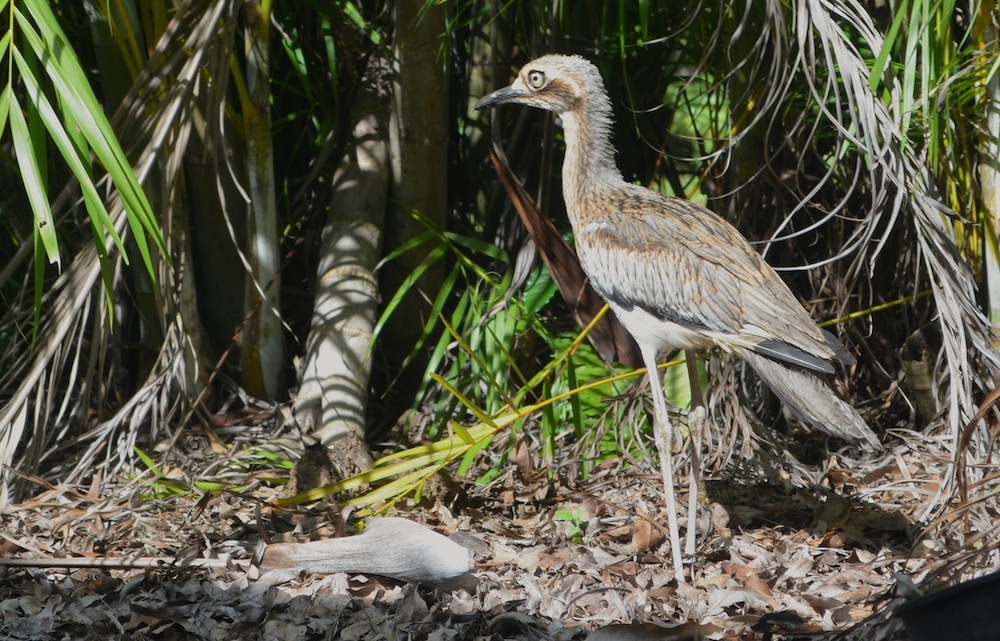
While I prepared a safe environment for our new guest Gill, being the amazing researcher she is, found this document which proved to be an invaluable resource. BSC are born precocial although parents often stay with the young for up to six months. It was clear by his size that Keith was at the upper age limit of what could be considered a BSC fledgling and should have been able to survive independently from his parents. We suspected he had been seperated from his parents by either bad weather, predators or traffic - he appeared 'clingy' and in need of reassurance. He was also ravenous. I dug up some earthworms from the garden which he ate greedily; since his diet also required a fairly significant amount of fresh meat we discovered he was quite partial to cat food. The next morning we let him out for a wander around the garden and to explore his new territory.
Bonding
Over the coming days Keith and I bonded in a way that I can only describe as magical. He followed me around the garden, responding to me with cheeps and chirupps, quizzically inspecting everything I did. When I went inside, he would sit at the window looking in. Since BSC are essentially nocturnal our activity times were not the same and when Keith should have been sleeping he instead followed me around. Eventually, fatigue would get the better of him and he would literally collapse. The first time I saw him sleeping I thought he had been killed so complete was his torpor. Then an eye would slowly open and he would haul himself onto his knees and get his bearings.
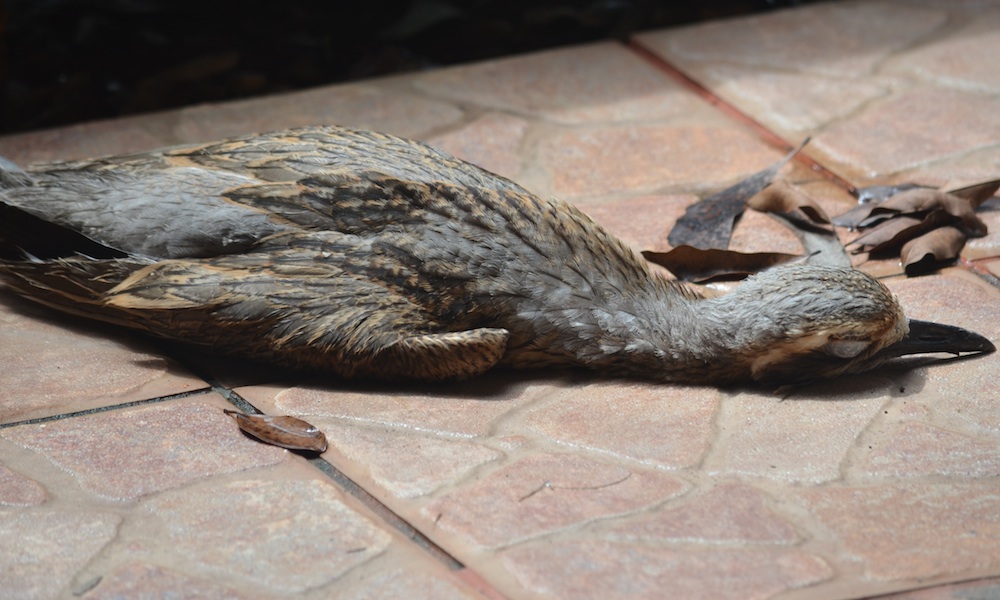
Being Responsible
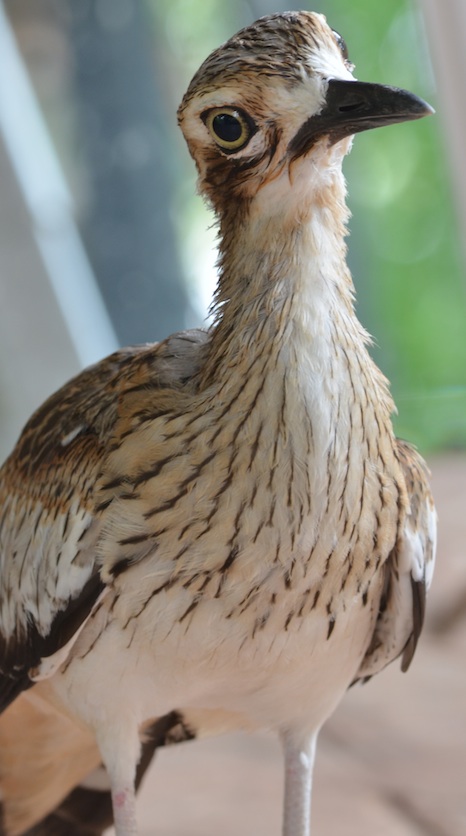 It became clear that as adorable as Keith was and as priveliged as I was to spend time with such a beautiful and intelligent creature, it would be wrong to domesticate him or for him to believe humans were benign. I rang the Territory Wildlife Park, which I knew had a night-time enclosure and kept BSCs - I spoke at length with someone who assured me they would take him. They would call me back the next week. The next week came and went, no call. In the meantime, Keith had set up residence on the front vernadah, he was no longer enclosed and free to come and go although he rarely ventured far.
It became clear that as adorable as Keith was and as priveliged as I was to spend time with such a beautiful and intelligent creature, it would be wrong to domesticate him or for him to believe humans were benign. I rang the Territory Wildlife Park, which I knew had a night-time enclosure and kept BSCs - I spoke at length with someone who assured me they would take him. They would call me back the next week. The next week came and went, no call. In the meantime, Keith had set up residence on the front vernadah, he was no longer enclosed and free to come and go although he rarely ventured far.
Every morning Keith would greet me, running towards me wings outstretched, circling me before gently pecking my leg. I would spend the late afternoons and early evenings encouraging him to fly; picking him up and launching him up in the air. A confusion of wings and legs would spiral perilously before somehow, impossibly, gracefully gliding safely to the ground. He would turn and run back to me, cheeping and chiruping, "again, Dad, again" I imagined.
I persevered with the Wildlife Park ringing again and again leaving messages. Still no call.
Then one morning, Keith wasn't there.
Spreading wings
Having once found Keith asleep under a tree some distance from the house, I searched the property hoping he was simply hanging out in a new location. I called his name, knowing from experience that he would respond if he heard me. But there was nothing, no reply. I was bereft and cursed the Territory Wildlife Park for their lackadaisical unprofessionalism. Roaming dogs (both wild and domesticated) are a constant threat to wildlife on our block and I was concerned he may have been taken.
A day and a night passed. The following morning I opened the laundry door to the garden and saw Keith sitting in a garden bed uder the kitchen window. He jumped up and ran to me making his entire range of strange calls. It was difficult to know who was more emotional, man or bird, but I shed a couple of tears of joy at seeing him greet me so excitedly. While it was a relief to see him safe and sound, it was clear Keith was also beginning to hear, and respond to, the call of the wild. It was in his nature and I was the one who had to adapt.
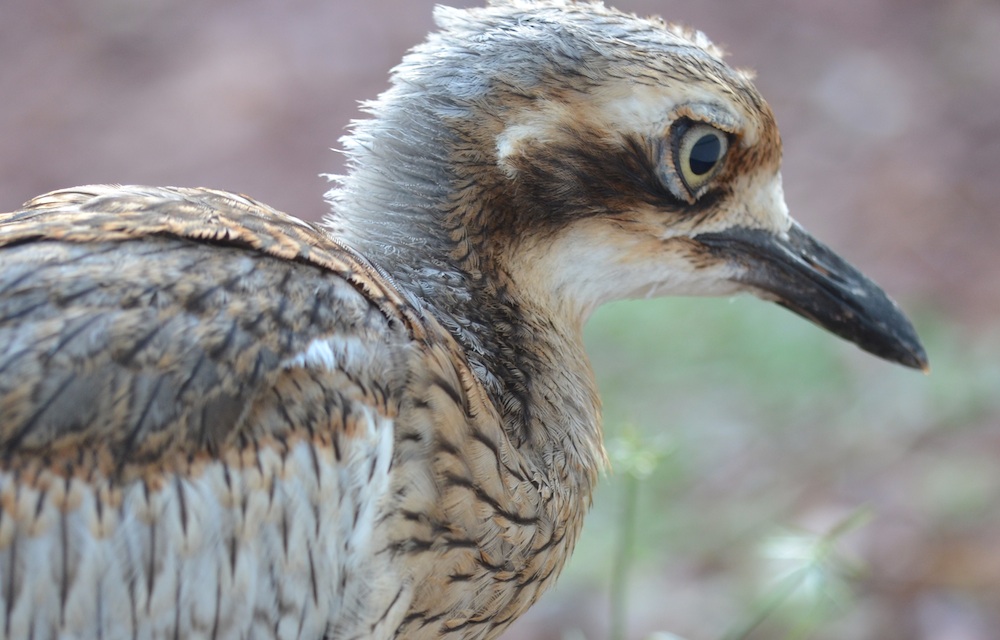
Learning to fly
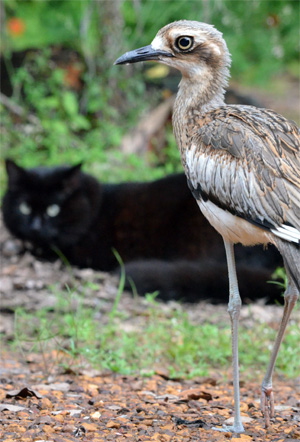 For the next few weeks Keith contented himself with what might be described as domesticity. He would breakfast on a mix of worms, cat food and fresh mince before sleeping next to the house until late afternoon when he would accompany me around the garden. He would occasionally 'attack' our soft and gentle cat, Quena, who had tolerated Keith's presence with equanimity and grace since his arrival (as well as sharing her food); they would conduct complex dances as they jostled for my attention and affection. Keith's flying lessons continued and he began taking brief flights around the garden, swooping over a bemused Quena before landing and proudly running in circles with his wings outstretched in triumph. At night he would hang out on the verandah, eating bugs attracted by the lights or simply sitting next to the window looking in at Quena and I.
For the next few weeks Keith contented himself with what might be described as domesticity. He would breakfast on a mix of worms, cat food and fresh mince before sleeping next to the house until late afternoon when he would accompany me around the garden. He would occasionally 'attack' our soft and gentle cat, Quena, who had tolerated Keith's presence with equanimity and grace since his arrival (as well as sharing her food); they would conduct complex dances as they jostled for my attention and affection. Keith's flying lessons continued and he began taking brief flights around the garden, swooping over a bemused Quena before landing and proudly running in circles with his wings outstretched in triumph. At night he would hang out on the verandah, eating bugs attracted by the lights or simply sitting next to the window looking in at Quena and I.
We were a very strange little family unit, human, feline and bird living in harmony.
Leaving Home
One evening in early April I can see Keith from my seat, I look away and then look through another window and see another curlew, it wanders past the verandah and into the darkness, calling. Over the next few nights the visits become a regular occurence, the calls close and plaintiff. By this time Keith has taken to following me when I go for my evening stroll around the block - as cute as this may be I worry he may not find his way home or may be attracted to car headlights. He is flying regularly and confidently now, so he should be able to flee from predators if required; nevertheless, I struggle with allowing him to do his own thing and my instinct to protect him. But part of me knows he needs he will leave at some point.
And on 17 April I wake up and Keith is nowhere to be found, I search the property and call his name, and in the evenings I walk the block in the hope he may appear. Days pass and I resolve not to get too upset over his disappearance - over the years living here I have discovered nature is harsh and brutal with little room for sentiment. Days turn into weeks, then a month, all I can hope is that Keith has bonded with the curlews who were so obviously curious about him.
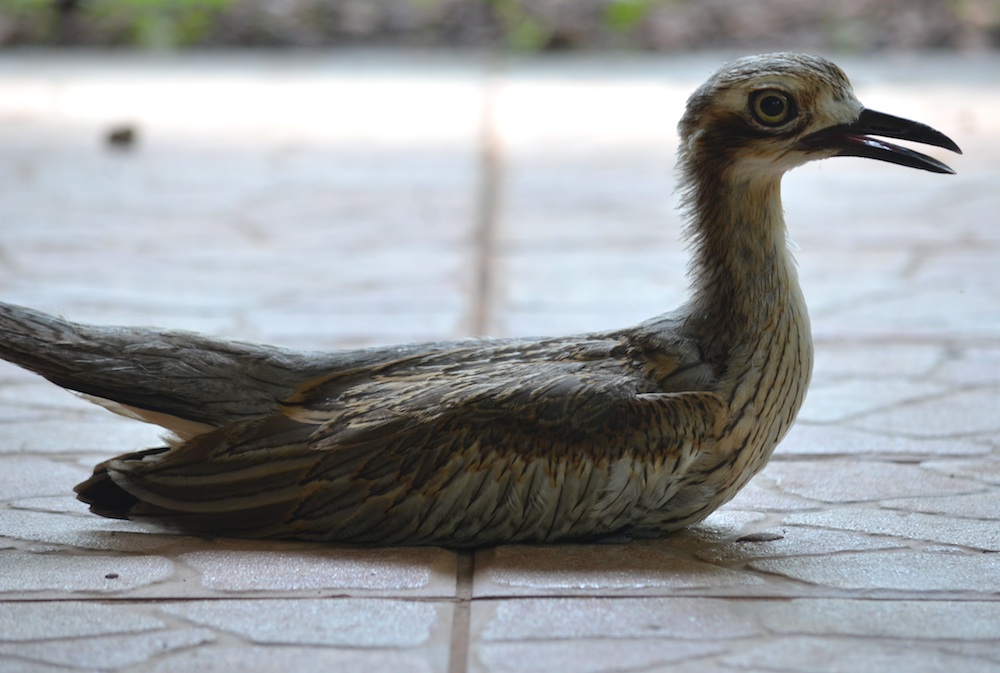
A Happy Ending....?
It is nearly the end of May and Keith has been gone for more than six weeks. I decide to remember him and share the little bit of magic he brought into my life by writing this blog post; I spend the day looking at photos, videos, writing and editing. It gets to early evening and while I'm only half way through I feel I'm making good progress. I sit back and look at the front verandah.
From the darkness a familiar figure emerges, smaller, dishevelled and clearly malnourished but its Keith. I open the door and he obviously recognises me, he cheeps a greeting and allows me to inspect him. I get him some food which is gratefully scoffed, then some more before a fresh bowl of water that is gulped down. We spend the next few hours reacquainting and I make sure he has enough food and water to make it through the night. The next morning he is still here and accepts some breakfast, his neck appears to be slightly injured with his feathers not sitting correctly. I bathe the wound in saline and believe he will make a full recovery with some TLC.
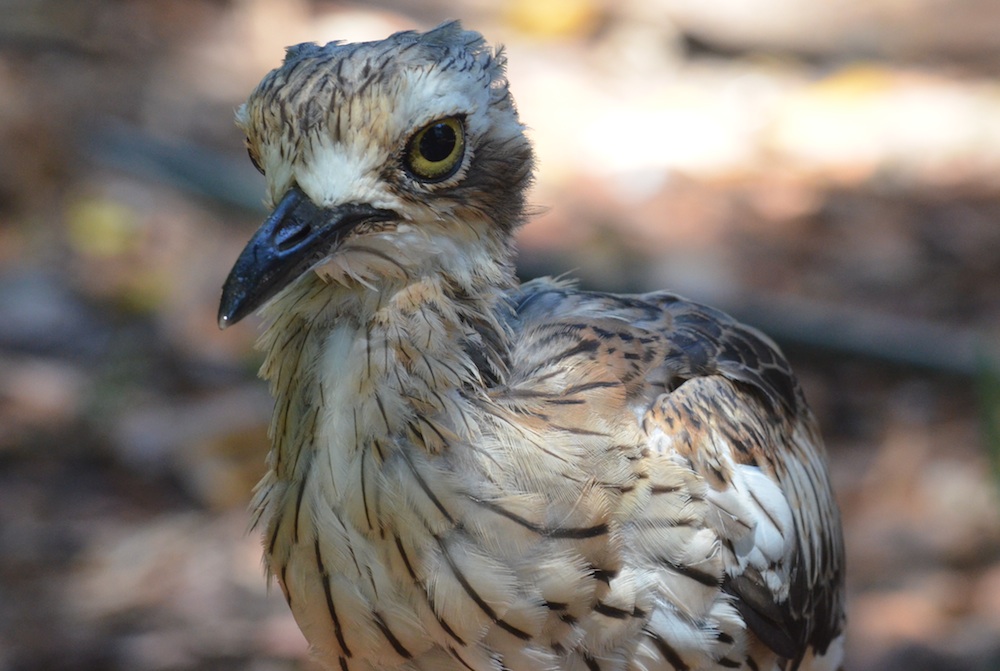
The question to which there is no clear answer is this: why did he return on the day that I was thinking about him so much?
Was this a coincidence?
Or was this (yet another) example of the theory that communication between all species is possible; that we are able to form bonds with other species based on respect, love and nurture that can be transmitted across distance?

Add new comment